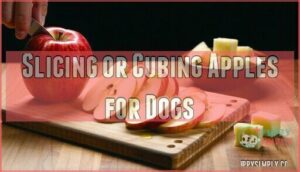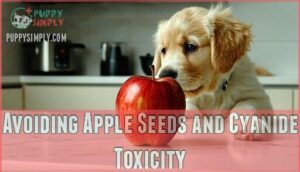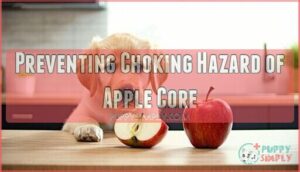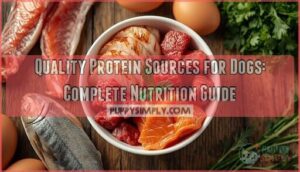This site is supported by our readers. We may earn a commission, at no cost to you, if you purchase through links.

You’ll want to remove the core, seeds, and stem first since apple seeds contain small amounts of cyanide. The flesh provides great benefits like fiber, vitamins A and C, and antioxidants that support your dog’s health.
Cut apples into bite-sized pieces to prevent choking. Start with small amounts to see how your pup’s stomach handles this new treat.
Most dogs love the sweet crunch, making apples a perfect low-calorie snack. Remember the golden rule: treats should only make up 10% of your dog’s daily food intake.
There are clever preparation methods that make apple feeding even safer.
Table Of Contents
Key Takeaways
- You can safely feed your dog apples when you remove the core, seeds, and stem first – apple seeds contain cyanide that’s toxic to dogs, so proper preparation prevents serious health risks.
- Start with small portions and cut apples into bite-sized pieces to prevent choking – small dogs need just 1-2 thin slices per day while large dogs can handle up to one whole apple weekly.
- Apples provide excellent health benefits for your dog including fiber, vitamins A and C, and antioxidants that support digestion, immunity, and dental health when used as low-calorie treats.
- Keep apple treats within 10% of your dog’s daily food intake and watch for allergic reactions like itching, swelling, or digestive upset when first introducing this new snack.
Dog Apple Safety
You can safely give your dog apples as a healthy treat when you follow the right steps.
Remove the core and seeds first since they contain harmful compounds that can make your pet sick.
General Guidelines for Feeding Apples
Anyone can safely feed their dog apples with proper preparation and vet consultation. Start with small puppy portions during apple introduction while keeping allergy watch for reactions. Safe storage maintains freshness for your furry friend.
Follow these essential steps for apples for dogs:
- Remove all seeds and cores completely
- Wash thoroughly before apple preparation dogs consume
- Cut into appropriate apple serving size pieces
- Monitor for any adverse reactions initially
Are apples safe? Yes, when prepared correctly for ideal dog health apples provide.
Benefits of Apples for Dogs
Your dog gets impressive apple benefits dogs when you serve this crunchy treat.
The Vitamin Content delivers immune boost through vitamins A and C.
Apples for dogs provide digestive health support with natural fiber that aids bowel movements.
These dogfriendly fruits offer dental benefits by cleaning teeth naturally.
Apple nutrition dogs love includes weight management support since they’re low-calorie treats packed with dog health apples advantages.
They also contain antioxidants for dogs that help reduce oxidative stress.
Risks and Precautions When Feeding Apples
Apple’s sweet appeal masks hidden dangers for your furry friend.
Apple seeds contain cyanide that builds up over time, while cores create serious choking hazards.
Watch for allergic reactions like itching or swelling when first introducing apples.
Too much fiber causes stomach upset, and sugar content can trigger digestive issues in sensitive dogs.
Apples also provide essential vitamins for dogs, contributing to their overall health.
Can Dogs Eat Apples
Most pet parents wonder if their furry friends can enjoy this crunchy treat alongside them. The short answer is yes – apples for dogs are generally safe and can be a healthy addition to your pup’s diet.
These fruits offer excellent apple nutrition, packed with vitamins A and C, fiber, and antioxidants that support canine digestion and overall health. However, not all dogs eat fruit the same way.
Some breeds show breed sensitivity to certain foods, so you’ll want to introduce apples gradually. Are apples safe for every dog? Most tolerate them well, but moderation is key. It’s also important to note that apple juice may contain xylitol, which is highly toxic to dogs.
Safe fruits dogs can enjoy include properly prepared apples, making them great treat alternatives to processed snacks. When considering dog diet apples, remember that safe fruits dogs consume should complement their regular meals, not replace them.
Your dog can definitely enjoy this sweet, nutritious snack with proper preparation. This allows for a healthy and balanced diet for your pet, ensuring they get the most out of their meals and treats.
Apple Preparation Tips
When you prepare apples for your dog, you’ll need to remove the core, seeds, and stem to keep your pet safe.
Proper preparation turns this healthy fruit into a safe treat that your dog can enjoy without any risks.
Washing and Removing Core, Seeds, and Stem
Three simple steps guarantee your dog’s apple treat stays safe.
First, rinse thoroughly under cold water to eliminate pesticide removal concerns. Next, slice around the center to extract the entire core – core toxicity from apple seeds containing cyanide poses real dangers.
Essential safety checklist:
- Remove every apple seed to prevent seed cyanide poisoning
- Cut away the complete core and stem dangers
- Scrub the skin using proper washing methods
- Double-check for missed fragments before serving
Slicing or Cubing Apples for Dogs
After properly washing your apple, the right slice size makes all the difference.
Cut apples into thin pieces about ¼-inch thick and 1-inch wide for most dogs. Cubing benefits smaller pups who need puppy portions, while senior dogs appreciate softer pieces.
Remember that pineapple cores pose risks due to their tough fibers.
This preparation reduces choking hazard and supports dental health, making apples for dogs both safe and enjoyable.
Baking or Making Homemade Apple Treats
Whip up healthy homemade treats using simple apple recipes dogs will love. Bake at 350°F for 15-20 minutes until golden.
Substitute whole wheat flour for regular flour and skip sugar completely. For convenient options, consider exploring pre-made dog treat mixes.
Store finished treats in airtight containers for up to one week. Check ingredient lists carefully for allergy considerations, avoiding xylitol and chocolate in all dog baking recipes.
Apple Feeding Guidelines
You’ve prepared the apple properly and now you need to know how much to give your dog.
Following the right portion sizes and watching for reactions will keep your pet safe and healthy.
Start Small and Monitor for Allergies
When introducing apples to your dog’s diet, start with a tiny piece to test for allergic reactions. Some dogs develop sensitivities to new foods, and breed sensitivity can vary.
Watch for these allergy symptoms:
- Itching or scratching
- Swelling around face or paws
- Vomiting or diarrhea
- Unusual lethargy
If symptoms appear, stop feeding apples and schedule a vet consultation immediately.
Portion Guidelines for Small and Large Dogs
Your dog’s size determines safe apple portions.
Small dog portions should include 1-2 thin slices per day, while large dog portions can handle up to one whole apple weekly.
Breed size matters more than you’d think – a Chihuahua needs bite-sized pieces, but a Golden Retriever tolerates larger chunks.
Consider your pup’s activity level and calorie considerations when serving apples for dogs.
Potential Side Effects of Overfeeding Apples
Too many apples can spell trouble for your furry friend.
Your dog’s stomach wasn’t built to handle apple overload, and crossing that line brings unwanted consequences.
Watch for these apple risks dogs face when portions get out of hand:
- Digestive upset – Diarrhea and stomach pain from fiber excess
- Sugar overload – Natural sugars cause digestive issues and weight gain
- Allergic reactions – Itching, swelling, or breathing problems
- Bloating – Too much fiber creates uncomfortable gas buildup
Safe Apple Consumption
You need to take specific steps to make apples safe for your dog to eat.
Proper preparation prevents serious health risks like cyanide poisoning and choking hazards that can harm your pet.
Avoiding Apple Seeds and Cyanide Toxicity
Apple seeds contain amygdalin, which releases cyanide when digested.
Apple seeds hide a deadly secret: amygdalin transforms into toxic cyanide inside your dog’s body.
Even small amounts can harm your dog.
Always remove seeds before serving apples for dogs.
Watch for toxicity symptoms like vomiting or difficulty breathing after accidental seed consumption.
Contact your vet immediately if seed removal wasn’t complete.
Pears, on the other hand, offer fiber for digestion if the skin is consumed.
| Risk Factor | Details |
|---|---|
| Cyanide Levels | Toxic amounts vary by dog size |
| Amygdalin Concerns | Compound breaks down into cyanide |
| Toxicity Symptoms | Vomiting, diarrhea, breathing issues |
Choose dogsafe foods and safe alternatives when uncertain about dog toxin exposure risks.
Preventing Choking Hazard of Apple Core
Beyond the toxic seeds lies another danger lurking in your fruit bowl.
Apple cores pose serious choking risks for dogs, especially small dog breeds with narrow airways. Core size matters – these chunks can lodge in throats or cause intestinal blockages.
Always supervise chewing and remove cores completely before offering apples for dogs. Dog apple core products are available online.
Keep first aid knowledge handy when introducing any dogs safe foods.
Creative Ways to Feed Apples to Dogs
Once you’ve mastered safe preparation, it’s time to get creative with serving.
Try making frozen apple bites for hot days or stuff apple pieces into Kong toys.
Blend apples into smoothie recipes with dog-safe ingredients.
Use small apple chunks as training rewards during practice sessions.
Sprinkle diced apples as food toppers over regular meals for extra nutrition.
Consider using apples in dog Kong recipes for enrichment.
Frequently Asked Questions (FAQs)
Can dogs eat Red Delicious apples?
Like a crisp autumn leaf, Red Delicious apples offer your dog a sweet, healthy treat.
You can safely share them after removing seeds and core.
Cut into small pieces to prevent choking and support their wellbeing.
Can dogs eat apple skins?
Yes, dogs can safely eat apple skins when properly washed.
The skin provides extra fiber and acts like a natural toothbrush, helping clean teeth.
Just make certain you’ve removed all pesticide residue beforehand.
Can dogs eat apple slices?
Apple slices are like bite-sized treasures for your furry friend.
You can safely feed your dog apple slices after removing seeds and cores.
Cut them small to prevent choking and serve in moderation, this is a complete concept to ensure your dog’s safety.
Are apples good for dogs?
Dogs absolutely benefit from eating apples.
They’re packed with vitamins A and C, fiber, and antioxidants that boost immunity and support digestion.
Just remove seeds and cores first—they’re toxic to your furry friend, so apples should be prepared carefully to ensure they’re safe for consumption.
Can dogs eat applesauce?
Plain applesauce can be a sweet treat for your furry friend, but you’ll want to check the ingredients first.
Skip varieties with added sugar, xylitol, or spices—these can upset your dog’s stomach or cause serious health issues.
Can dogs eat apple seeds?
No, you shouldn’t let your dog eat apple seeds.
They contain amygdalin, which releases toxic cyanide when chewed.
Always remove seeds and cores before giving your pup apple slices as treats.
How much apple can I give my dog?
Like Goldilocks finding the perfect porridge, you’ll want to give your dog just the right amount of apple.
For small dogs, offer a few slices weekly. Medium dogs can have several slices per week.
Large dogs handle slightly bigger portions safely.
Can a dog eat apples with skin?
Yes, your dog can safely eat apples with the skin on.
Just wash the apple thoroughly first to remove any pesticides or dirt.
The skin provides extra fiber and acts like a natural toothbrush.
Can dogs eat raw apples?
Why wouldn’t you want to share this crunchy treat with your furry friend?
Dogs can absolutely eat raw apples.
Just remove the seeds and core first—they’re toxic.
Your pup will love this healthy, vitamin-packed snack.
What foods are poisonous to dogs?
Many common foods can poison your dog.
Chocolate, grapes, raisins, onions, garlic, avocado, xylitol (artificial sweetener), macadamia nuts, alcohol, and caffeine are toxic.
Always check before sharing human food with your pup.
Conclusion
Treating your dog to apples opens the door to a world of healthy snacking when done correctly.
Can dogs eat apples? Absolutely, but preparation matters most.
Remove seeds and cores, slice into appropriate sizes, and start with small portions.
Your furry friend will thank you for this nutritious treat that supports their health.
Remember to keep apple treats within the 10% rule of their daily diet.
With proper care, apples become a safe, delicious reward your dog will love.
- https://pets.webmd.com/dogs/diabetes-dog-diet
- https://www.merckvetmanual.com/special-pet-topics/poisoning/cyanide-poisoning
- https://doggyzine.com/en/nutrition/can-dogs-eat-apples-safely/
- https://www.countryvetmom.com/post/apples-for-dogs-yes-or-no-country-vet-mom-explains-the-benefits-and-risks-dr-gaffud
- https://brownvethospital.com/blog/can-dogs-eat-apples/













